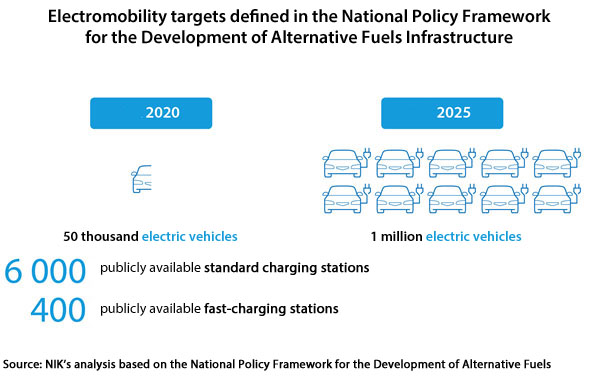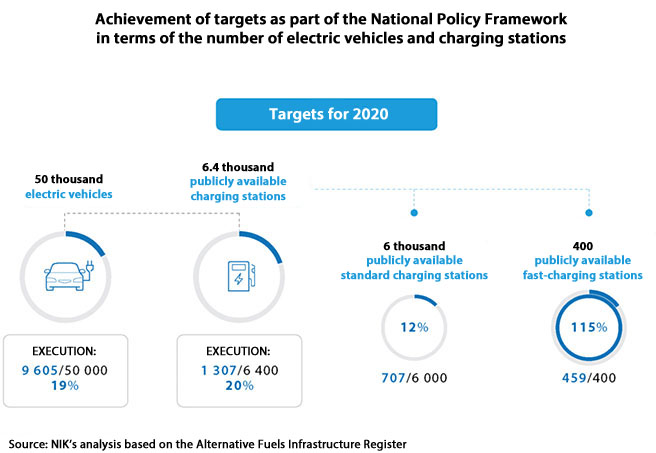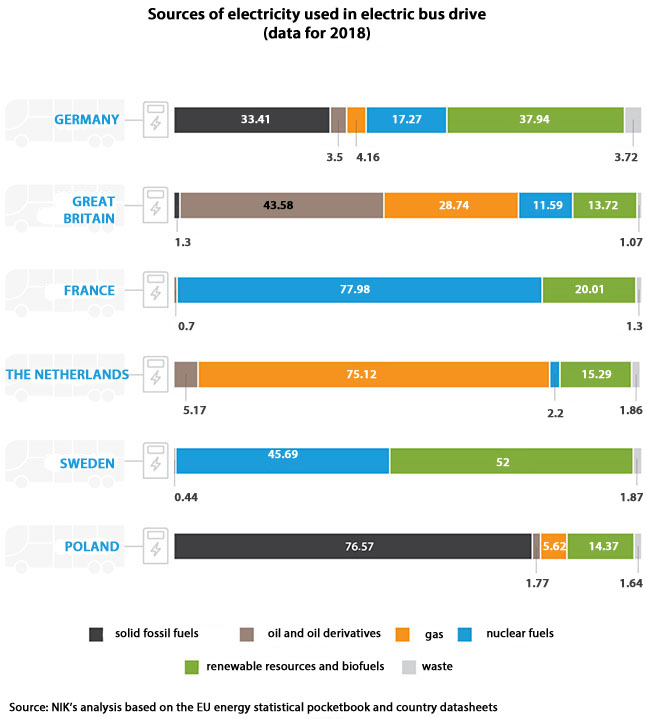According to the data of the International Power Agency, in 2019 the global market of electric cars reached 7.2 million. The leader in this area is China where 3.4 million cars have electric drive. It makes up 47% of all electric cars worldwide and only in 2019, as many as 1.06 million new ones were sold. The second place is taken by Europe with 1.7 million electric cars, including 561 thousand ones newly purchased in 2019. In Norway about 80 thousand electric cars were sold, in Germany 109 thousand and in Great Britain 75 thousand.
The results of Poland are quite poor in comparison. In line with the Electromobility Counter operated by the Alternative Fuels Association, at the end of 2019 there were 8637 electric cars on Polish roads in total and only 4003 vehicles were newly bought. The governmental Electromobility Development Plan was to change that situation. It was one of the strategic programmes being part of the Strategy for Responsible Development (published in 2016) by 2020. It provided among other things for the “E-bus” programme which was to stimulate the design and production of Polish electric cars for public transport. Another programme “The electric car” aimed to foster the development of technologies, production and the electric car market.

In March 2017, the Council of Ministers adopted the Electromobility Development Plan in Poland “Energy to the future” and the National Policy Framework for the Development of Alternative Fuels Infrastructure. According to the National Policy Framework, there should be one million electric cars on the Polish roads by 2025. Besides, the Electromobility Act made the use of electric cars obligatory for public institutions. For individual periods the minimum percentage of electric cars in car fleets was defined.
NIK has verified if the public administration effectively performed its tasks related to the development of electromobility in Poland. The audit covering the period 2016-2019 was carried out in the Ministry of Energy (currently the Ministry of State Assets), the National Centre for Research and Development (NCRD) and in 26 municipal offices.
Electromobility in Poland is still at its initial stage, although in 2019 three years passed since its development plans were presented. By the end of the audit in January 2020, the vision of electromobility presented in the Strategy for Responsible Development, then included in the operational documents prepared by the government, was not implemented in the assumed shape. The reasons included delays in the execution of specific tasks and inconsistency in implementing the planned instruments.
According to NIK there is a significant risk that the target of 1 million registered electric cars in 2025 (as assumed in the governmental document) may not be met. Moreover, it is highly probable that the target of 50 thousand registered electric cars in 2020 in Poland will not be achieved. By the end of July 2020, only 13057 electric vehicles were registered, which is about 26% of the 2020 target. Even the strategic documents adopted by the government in 2019 revealed gradual withdrawal from the vision of one million electric cars in 2025. It was assumed in the Sustainable Transport Strategy by 2030 that the electric car fleet will count 600 thousand cars as a target.
Also, the number of commonly available car charging stations is smaller than planned. According to the data in the Alternative Fuels Infrastructure Register, by 2019 only 1307 charging points were launched, which is 20.4% of their number assumed in the National Policy Framework to be achieved in 2020. However, the target of installing fast-charging stations was met in 115% (459 stations). The main reasons of the poor development of the car charging infrastructure was the initial small number of car charging stations and the need to catch up with delays. The costs of building infrastructure and the costs of its functioning were too high in view of the small market of electric cars. Out of 21 audited cities with at least100 thousand inhabitants, only in Katowice the infrastructure development exceeded the threshold set out in the Electromobility Act at the end of 2020.

The Low-Emission Transport Fund, which was to be the source of financial support among others for local governments and public institutions, did not work as it should. The direct payment system for the purchase of electric cars and for the development of car charging infrastructure was not implemented. One of the reasons were significant delays in implementing new provisions of law. Only at the end of December 2019, the Minister of State Assets passed key ordinances to the Act on Low-Emission Transport Fund which in fact did not enter into force. Instead of direct payments, the total of PLN 684 thousand from the Fund was earmarked for the support of the Fund which did not work in operational terms.
The future of electromobility in local governments is also uncertain. Local governments were supposed to play the model role as the administration representatives implementing electromobility. They were to purchase electric cars for the fleets of municipal offices servicing them, providing public services or the fleets providing them by external entities as well as city transport fleets. At the end of 2019, as much as 79% of audited cities did not have a single electric car in the municipal office fleet. At the same time, 18% of the cities met the statutory requirement of 10% of electric cars in the municipal office fleet even before the deadline of 1 January 2022. The requirements were hard to meet also due to financial issues, including the lack of subsidies from the Low-Emission Transport Fund and the lack of subsidies for other forms of acquiring electric cars than the purchase. Another problem is unrealistic deadlines defined in the Act, related to the use of electric cars to provide public services. Since there are no specialist cars with required electric or gas drive in the market, as signalled by the cities, it will be difficult to meet the statutory requirements. Hence, a risk may arise that the contracts for public services signed with external entities referred to in the Act on electromobility may expire. Besides, the risk analysis conducted by NIK with the participation of the cities in April-May 2020 shows that due to the financial standing of local governments related the pandemic, any investments in the electric car fleet may be suspended or significantly restricted.
The most significant progress could be observed in terms of meeting the requirement of 5% share of zero-emission buses in the public transport fleet starting 1 January 2021. At the end of 2019, eight of 28 entities (29%) already met that requirement, mainly thanks to the support of the EU funds. The electromobility development rate in the city transport was also influenced by Poland’s energy mix. The results of only three out of 28 cost and benefit analyses provided to NIK during the audit indicated that investments in the zero-emission public transport are justified. The scepticism resulted mainly from high prices of zero-emission buses and the need to incur high extra expenditures for the battery charging installation. Another reason was related to high levels of pollutants emitted during the electricity production in Poland (since the production takes place in coal power plants).

The works on all electric car construction projects are delayed. As a result of wrong decisions, at least PLN 7 million was spent ineffectively. As part of the Zero-Emission Public Transport, the National Centre for Research and Development planned the development and delivery of about 100 innovative, zero-emission public transport buses to the local government units by 2023. Since no analyses were made, the requirements proved unrealistic in Polish economic conditions. Moreover, they were not adapted to the needs of the cities which expected simple, cheap, reliable and low-emission vehicles. Finally, in April 2020, the Centre withdrew from the Programme. Thus, the expenditures for the Programme implementation of over PLN 7 million turned out to be ineffective. Also, the cities which participated in the Programme were deprived of the guarantee of non-repayable subsidy for the zero-emission buses. At the same time, the NCRD’s works on the e-Van programme, which were going on since 2017, did not bring about the desired effects and until the end of 2019 the programme remained in its conceptual phase. The first court proceedings were started only in May 2020. As regards the project for launching the production of the Polish electric car (started in January 2017) it still remains in its preliminary phase, i.e. two prototypes were presented in July 2020 (out of five running prototypes initially planned for June 2018).
To date, due to stringent rules the so-called clean transport zones in cities have not worked properly. Such a zone was created inly in Cracow. Though, after about three months, the rules of its functioning were relaxed which led to its wind-up. The rules were changed following requests of Cracow inhabitants and pressure of entrepreneurs operating in that zone. The entry ban for all cars with combustion and diesel engines turned out to be too strict in the Polish realities. In practice the clean transport zone would turn into a traffic-free zone.
Recommendations
The Supreme Audit Office has requested that legislative works should be started to implement the amendments and the new regulations listed below - de lege ferenda proposals:
to the Minister of Climate:
- to amend the Act on Electromobility to:
- enable the creation of low-emission transport zones;
- make sure the contracts for public services expire on deadlines set out in the contracts;
- make sure local governments may withdraw from making cost and benefit analyses in certain circumstances;
Also:
- an effective system to monitor the discharge of duties under the Act on Electromobility should be set up;
- measures to establish essential regulations in the area of intelligent electricity grid should be intensified;
- all the remaining executive acts should be issued with the Act on Electromobility.
The NIK audit also ended with system recommendations addressed by NIK:
to the Minister of Climate to:
- update the Electromobility Development Plan in Poland;
- consider the point in using the mechanism where the vehicle registration fee is determined by the pollutant emission level, age and price of vehicles;
- the measures defined in the government’s strategic documents on electromobility should be correlated with the measures aimed at withdrawing from the electricity production from fossil fuels and the measures taken for the closed-circuit economy;
- financial instruments supporting local governments in the discharge of statutory duties laid out in the Act on Electromobility should be introduced.


